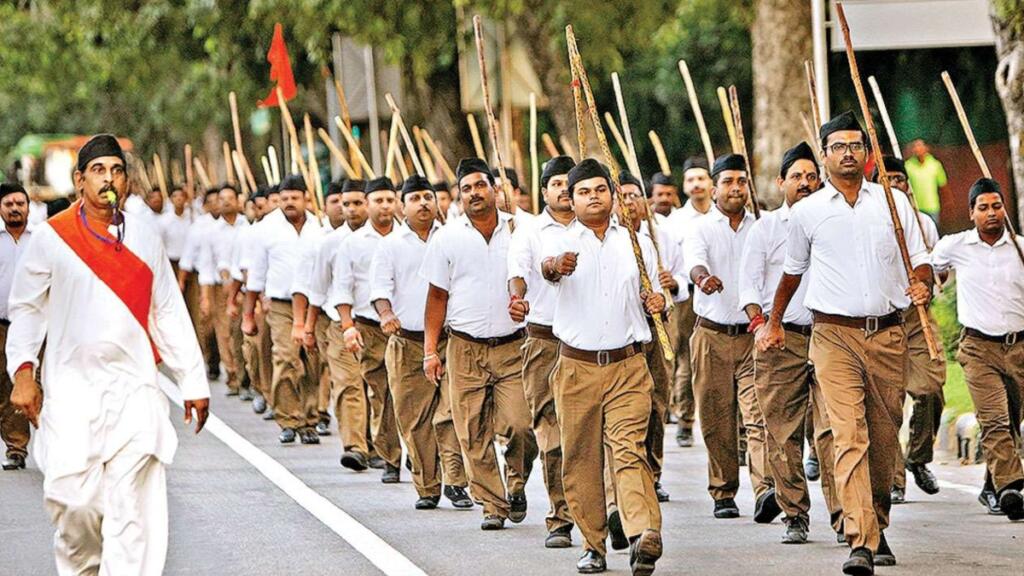In a landmark ruling, the Madhya Pradesh High Court has declared the long-standing ban on government employees joining the Rashtriya Swayamsevak Sangh (RSS) as “arbitrary.” This decision marks a significant victory for the RSS, overturning Office Memorandums (OMs) issued by Congress governments in 1966, 1970, and 1980.
Court’s Reasoning
The court found that these OMs lacked substantial evidence to justify banning government employees from associating with the RSS. Importantly, the judges ruled that executive-issued OMs cannot prohibit RSS membership, as they do not constitute law under Article 13(3)(a) of the Constitution.
The Division Bench, comprising Justices Sushrut Arvind Dharmadhikari and Gajendra Singh, emphasized that any restriction on joining the RSS should be implemented through proper conduct rules, not executive OMs. This approach, they argued, avoids infringing on the fundamental rights of both government employees and RSS members.
RSS Activities and Contributions
The court highlighted the RSS’s diverse activities:
-Social Service through RSS
– Educational initiatives like Saraswati Shishu Mandirs
– Disaster relief efforts
– Health-related programs
The judges emphasized that RSS membership doesn’t automatically imply involvement in political or anti-secular activities. They noted the organization’s significant role in community service, often conducted without political ambitions.
Government’s Review Process
While the current government has removed the RSS from the “don’t join” list, the court stressed that any future restrictions must be based on:
– Thorough analysis
-Substantial evidence
– Consideration of RSS’s non-political activities
The court questioned whether any empirical data or surveys were used to justify the original ban, expressing displeasure at the Union of India’s failure to provide such information despite repeated inquiries.
Implications for Government Employees
This ruling opens doors for central government employees, both current and retired, to participate in RSS activities. The court noted that the ban had “diminished aspirations” of many employees over five decades.
The case originated from a plea by Purushottam Gupta, a retired central government employee seeking permission to join the RSS. Gupta argued that the existing rules were “an impediment for him to gratify his desires at the dusk of his life.”
RSS: Beyond Politics
The court recognized the RSS as a “nationally established self-driven voluntary organisation” with a significant membership across India. It emphasized that most RSS activities are unrelated to politics and focus on social welfare.
The judges specifically mentioned Rashtriya Seva Bharti (RSB), an RSS-affiliated organization working to unite nationalist and patriotic groups. They also highlighted the RSS’s involvement in flood relief efforts and other disaster management activities.
Looking Ahead
The Department of Personnel and Training and the Ministry of Home Affairs must now:
* Publicize the circular removing the RSS ban
* Distribute information to relevant ministries within nine days
This ruling marks the end of a 58-year-old restriction and potentially reshapes the relationship between government employees and the RSS.
Historical Context
The original ban on RSS membership for government employees was enacted in November 1966 during Indira Gandhi’s tenure as Prime Minister. Notably, this decision followed closely after the RSS-backed Cow Protection/Anti-Cow Slaughter Movement on November 7, 1966.
For decades, individuals associated with the RSS faced obstacles in joining government services or were removed from their posts. Police verifications often prevented candidates with past RSS links from securing government jobs.
Court’s Final Observations
The Madhya Pradesh High Court lamented that it took nearly five decades for the Central Government to acknowledge and rectify what they deemed a mistake in banning the RSS. They described the RSS as an “internationally renowned organisation” and criticized the arbitrary nature of its inclusion on the list of banned organizations.
The court emphasized that they must intensely deliberate and gather substantial evidence before any future attempts to reinstate the RSS on a “don’t join” list. This approach aims to protect the constitutional rights of government employees who may have ideological or emotional connections to the RSS.
